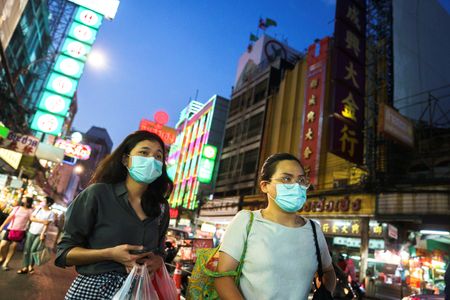By Satawasin Staporncharnchai
BANGKOK (Reuters) – Thailand’s headline inflation cooled to its lowest rate in nine months and came in below analyst forecasts, helped by easing energy and food prices, with the commerce ministry predicting consumer prices will decline further this year.
The headline consumer price index (CPI) rose 5.02% in January from a year earlier, ministry data showed on Monday, compared with a forecast in a Reuters poll for a rise of 5.12%.
Inflation is expected to be below 5% in February on lower oil prices, senior commerce ministry official Wichanun Niwatjinda told a news conference.
“Oil accounted for one percentage point of inflation in January. So, if oil prices fall, it will reduce inflation a lot,” he said.
Still, the inflation rate remains above the central bank’s target range of 1% to 3%, suggesting the Bank of Thailand (BOT) will raise its key interest rate further after hiking it at four consecutive meetings to try to bring prices back within target.
The core CPI index was up 3.04% in January from a year ago, versus a forecast rise of 3.10%.
The BOT said earlier that a continuing gradual rate rise is an appropriate course for a policy consistent with growth and inflation. It will next review policy on March 29.
Finance minister Arkhom Termpittayapaisith said inflation should return to target this year.
Sharing a similar view, the commerce ministry is maintaining its forecast for headline inflation at 2% to 3% this year, having taken into account the upcoming elections and a rebound in tourism, Wichanun said.
The ministry predicts 22 million to 25 million foreign tourist arrivals this year, he said, adding higher tourist numbers would increase demand-side inflation.
In 2022, headline inflation hit a 24-year high of 6.08%, with the core rate at 2.51%.
(Reporting by Satawasin Staporncharnchai; Writing by Orathai Sriring; Editing by Ed Davies)

